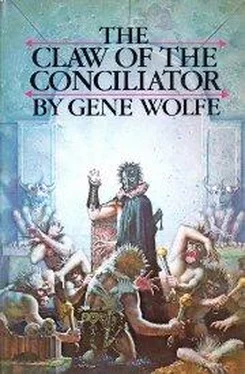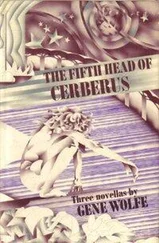But now we had come to a town where no voice sounded but the raven’s. Although we had carried water in skin bags from the herdsman’s house, it was nearly gone. Jolenta was weaker, and Dorcas and I agreed that if we did not find more by nightfall, it was likely she would die. Just as Urth began to roll across the sun, we came upon a broken sacrificial table whose basin still caught rain. The water was stagnant and stinking, but in our desperation we allowed Jolenta to drink a few swallows, which she immediately vomited. Urth’s turning revealed the moon, now well past the full, so that we gained her weak greenish gleam as we lost the sunlight.
To have come upon a simple campfire would have seemed a miracle. What we actually saw was stranger but less startling. Dorcas pointed to the left. I looked, and a moment later beheld, as I thought, a meteor. “It’s a falling star,” I said. “Did you see one before? They come in showers sometimes.”
“No! That’s a building — can’t you see it? Look for the dark place against the sky. It must have a flat roof, and someone’s up there with flint and steel.”
I was about to tell her that she imagined too much, when a dull red glow no bigger, it seemed, than the head of a pin, appeared where the sparks had fallen. Two breaths more, and there was a tiny tongue of flame.
It was not far, but the dark and the broken stones we rode over made it seem so, and by the time we reached the building the fire was bright enough for us to see that three figures crouched about it. “We need your help,” I called. “This woman is dying.”
All three raised their heads, and a crone’s screech asked, “Who speaks? I hear a man’s voice, but I see no man. Who are you?”
“Here,” I called, and threw back my fuligin cloak and hood. “On your left. I’ve dark clothes, that’s all.”
“So you do… so you do. Who’s dying? Not little pale hair… big red-gold. We’ve wine here and a fire, but no other physic. Go around, that’s where the stair is.”
I led our animals around the corner of the building as she had indicated. The stone walls cut off the low moon and left us in blind darkness, but I stumbled on rough steps that must have been made by piling stones from fallen structures against the side of the building. After hobbling the two destriers, I carried Jolenta up, Dorcas going before us to feel the way and warn me of danger.
The roof, when we reached it, was not flat; and the pitch was great enough for me to fear falling at every step. Its hard, uneven surface seemed to be of tiles — once one loosened, and I heard it grating and clattering against the others until it fell over the edge and smashed on the uneven slabs below.
When I was an apprentice and too young to be entrusted with any but the most elementary tasks, I was given a letter to take to the witches’ tower, across the Old Court from our own. (I learned much later that there was a good reason for selecting only boys well below the age of puberty to carry the messages our proximity to the witches required.) Now, when I know of the horror our own tower inspired not only in the people of the quarter but to an equal or greater degree in the other residents of the Citadel itself, I find a flavor of quaint naiveté in the recollection of my own fear; yet to the small and unattractive boy I was, it was very real. I had heard terrible stories from the older apprentices, and I had seen that boys unquestionably braver than I were afraid. In that most gaunt of all the Citadel’s myriad towers, strangely colored lights burned by night. The screams we heard through the ports of our dormitory came not from some underground examination room like our own, but from the highest levels; and we knew that it was the witches themselves who screamed thus and not their clients, for in the sense we used that word, they had none. Nor were those screams the howlings of lunacy and the shrieks of agony, as ours were.
I had been made to wash my hands so they would not soil the envelope, and I was very conscious of their dampness and their redness as I picked my way among the puddles of freezing water that dotted the courtyard. My mind conjured up a witch who should be immensely dignified and humiliating, who would not shrink from punishing me in some particularly repulsive way for daring to carry a letter to her in red hands and would send me back with a scornful report to Master Malrubius as well.
I must have been very small indeed: I had to jump to reach the knocker. The smack of the witches’ deeply worn doorstep against the thin soles of my shoes remains with me still.
“Yes?” The face that looked into mine was hardly higher than my own. It was one of those — outstanding of its kind among all the hundreds of thousands of faces I have seen — that are at once suggestive of beauty and disease. The witch to whom it belonged seemed old to me and must actually have been about twenty or a little less; but she was not tall, and she carried herself in the bent-backed posture of extreme age. Her face was so lovely and so bloodless that it might have been a mask carved in ivory by some master sculptor.
Mutely, I held up my letter.
“Come with me,” she said. Those were the words I had feared, and now that they had actually been given voice, they seemed as inevitable as the procession of the seasons.
I entered a tower very different from our own. Ours was oppressively solid, of plates of metal so closely fitted that they had, ages ago, diffused into one another to become one mass, and the lower floors of our tower were warm and dripping. Nothing seemed solid in the witches’ tower, and few things were. Much later, Master Palaemon explained to me that it was far older than most other parts of the Citadel, and had been built when the design of towers was still little more than the imitation in inanimate materials of human physiology, so that skeletons of steel were used to support a fabric of flimsier substances. With the passing of the centuries, that skeleton had largely corroded away — until at last the structure it had once stiffened was held up only by the piecemeal repairs of past generations. Oversized rooms were separated by walls not much thicker than draperies; no floor was level, and no stair straight; each banister and railing I touched seemed ready to come off in my hand. Gnostic designs in white, green, and purple had been chalked on the walls, but there was little furniture, and the air seemed colder than that outside.
After climbing several stairs and a ladder lashed together from the unpeeled saplings of some fragrant tree, I was ushered into the presence of an old woman who sat in the only chair I had yet seen there, staring through a glass tabletop at what appeared to be an artificial landscape inhabited by hairless, crippled animals. I gave her my letter and was led away; but for a moment she had glanced at me, and her face, like the face of the young-old woman who had brought me to her, has of course remained graven in my mind.
I mention all this now because it seemed to me, as I laid Jolenta on the tiles beside the fire, that the women who crouched over it were the same. It was impossible; the old woman to whom I had handed my letter was almost certainly dead, and the young one (if she were still living) would be changed beyond recognition, as I was myself. Yet the faces that turned toward me were the faces I recalled. Perhaps there are but two witches in the world, who are born into it again and again.
“What is the matter with her?” the younger woman asked, and Dorcas and I explained as well as we could.
Long before we finished, the older one had Jolenta’s head in her lap and was forcing wine from a clay bottle into her throat. “It would harm her if it were strong to harm,” she said. “But this is three parts pure water. Since you do not wish to see her die, you are fortunate, possibly, to have come across us so. Whether she is also fortunate, I cannot say.”
Читать дальше










